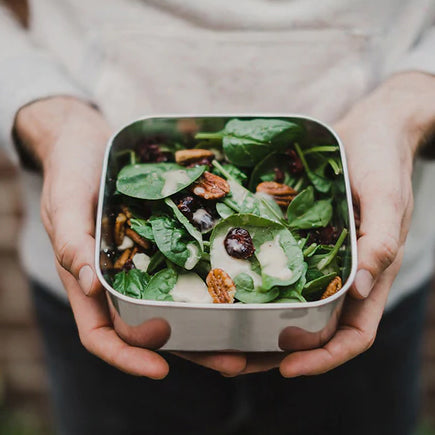Product Information
Why upgrade to platinum-grade silicone lids?
The global movement to reduce single-use plastic is hitting the mainstream, and many people are trying to reduce plastic altogether. Our new food-grade platinum silicone lids meet FDA standards, as well as strict European LFGB standards prohibiting fillers.
Our new silicone lids fit all of our stainless steel containers and are a perfect choice for a completely plastic-free lunchbox. The benefits are endless: plastic-free (of course), leak-proof (and airtight), durable (crack free), flexible (easy for little hands to open), dishwasher safe (easy to sanitize), resilient in high temperatures (and in the freezer) and clear as glass (and colourful options too).
Not just for school lunches
In addition to daily school lunches, our products are ideal for work lunches, outdoor adventures, travel, picnics, playdates, parks, takeout, salad bars, bulk shopping, meal prep and family leftovers. They're essential for kitchen organisation, and perfect for the countertop, pantry, fridge and freezer. Parents use our insulated totes and ice packs to keep baby bottles cold. Grown-ups love our products because they help reduce waste and eat healthier at work and in the kitchen, so the whole family can stop using plastic baggies and other single-use disposable packaging at home and on the go.
Product safety and testing
As of 2022 our complete U-Konserve range is Plastic Free. Our products are non-toxic, safe products that are tested by CPSIA-accredited independent labs to ensure that they are free of BPA, BPS and phthalates.
Product materials & care
Stainless Steel Containers are made from 18/8 stainless steel. Silicone lids are made from platinum-grade, food-grade silicone that pass strict EU LFGB standards. Our old-style plastic lids are made from LDPE #4 plastic. Old style plastic dividers are made from PP#5 plastic. All products are top-rack dishwasher safe. Containers and lids are freezer safe. Containers are oven safe up to 150 degrees C.
Plastic numbers explained
Our older style discontinued plastic containers use PET #1, LDPE #4 and PP #5 plastics. We advocate for using plastic safely (not microwaving or heating) and getting to know your plastics. There are possible health risks with some types of plastics, so we only ever used plastics that are safe for food storage. As of 2022, our range of products is completely Plastic Free. See our new range of Stainless Steel Containers with Silicone Lids.
#1 - PET or PETE - polyethylene terephthalate is used in many water and juice bottles. It is commonly recycled and accepted by most kerbside programs and recycling centres.
#2 - HDPE - high-density polyethylene is common in milk jugs, detergent and shampoo bottles. It is usually accepted by most kerbside programs and recycling centres.
#3 - PVC - vinyl or polyvinyl chloride is a known human carcinogen, often contains phthalates and is not recyclable. Phthalates add flexibility and durability to PVC and vinyl. They are present in products like toys, food packaging, plastic wrap, shower curtains, lotions, perfume, air fresheners and candles. Phthalates are listed as reasonably anticipated to be a human carcinogen by the National Toxicology Program, and are considered a probable human carcinogen and endocrine disruptor by the EPA. Even though phthalates have been banned from some baby toys and baby gear, they are still allowed in lunch bags and food containers, so always choose phthalate-free.
#4 - LDPE - low-density polyethylene is common in plastic bags, cling wraps, baby bottles and reusable drink and food containers. It is recyclable at most recycling centres and some kerbside programs.
#5 - PP - polypropylene can be found in baby bottles, yogurt containers, and many reusable food and drink containers. It is recyclable in some kerbside programs and most recycling centres.
#6 - PS - polystyrene is used in takeout food containers, Styrofoam containers and cups, and plastic cutlery. It has been found to leach styrene, a neurotoxin and possible human carcinogen, and has been banned in many U.S. cities. It is not easily recyclable.
#7 OTHER - This catchall category includes polycarbonate which has been found to leach bisphenol A (BPA), a hormone disruptor that mimics estrogen. Bioplastics (plant-based) are also in this category but cannot be recycled and are usually sent to landfill unless directed to a bioplastic-specific composting facility.
Product manufacturing
Our products are designed in Boulder, Colorado and responsibly made in China in facilities that are working toward green practices and supportive of our mission to reduce waste.

